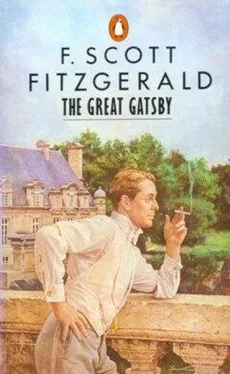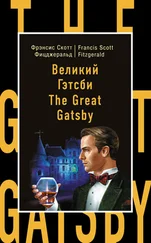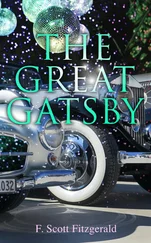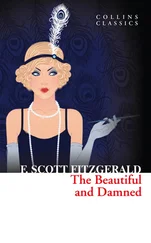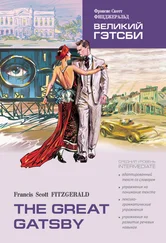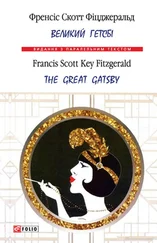Francis Fitzgerald - The Great Gatsby
Здесь есть возможность читать онлайн «Francis Fitzgerald - The Great Gatsby» — ознакомительный отрывок электронной книги совершенно бесплатно, а после прочтения отрывка купить полную версию. В некоторых случаях можно слушать аудио, скачать через торрент в формате fb2 и присутствует краткое содержание. Жанр: Классическая проза, на английском языке. Описание произведения, (предисловие) а так же отзывы посетителей доступны на портале библиотеки ЛибКат.
- Название:The Great Gatsby
- Автор:
- Жанр:
- Год:неизвестен
- ISBN:нет данных
- Рейтинг книги:5 / 5. Голосов: 1
-
Избранное:Добавить в избранное
- Отзывы:
-
Ваша оценка:
- 100
- 1
- 2
- 3
- 4
- 5
The Great Gatsby: краткое содержание, описание и аннотация
Предлагаем к чтению аннотацию, описание, краткое содержание или предисловие (зависит от того, что написал сам автор книги «The Great Gatsby»). Если вы не нашли необходимую информацию о книге — напишите в комментариях, мы постараемся отыскать её.
The Great Gatsby — читать онлайн ознакомительный отрывок
Ниже представлен текст книги, разбитый по страницам. Система сохранения места последней прочитанной страницы, позволяет с удобством читать онлайн бесплатно книгу «The Great Gatsby», без необходимости каждый раз заново искать на чём Вы остановились. Поставьте закладку, и сможете в любой момент перейти на страницу, на которой закончили чтение.
Интервал:
Закладка:
She turned to Mrs. McKee and the room rang full of her artificial laughter.
“My dear,” she cried, “I’m going to give you this dress as soon as I’m through with it. I’ve got to get another one to-morrow. I’m going to make a list of all the things I’ve got to get. A massage and a wave, and a collar for the dog, and one of those cute little ash-trays where you touch a spring, and a wreath with a black silk bow for mother’s grave that’ll last all summer. I got to write down a list so I won’t forget all the things I got to do.”
It was nine o’clock—almost immediately afterward I looked at my watch and found it was ten. Mr. McKee was asleep on a chair with his fists clenched in his lap, like a photograph of a man of action. Taking out my handkerchief I wiped from his cheek the remains of the spot of dried lather that had worried me all the afternoon.
The little dog was sitting on the table looking with blind eyes through the smoke, and from time to time groaning faintly. People disappeared, reappeared, made plans to go somewhere, and then lost each other, searched for each other, found each other a few feet away. Some time toward midnight Tom Buchanan and Mrs. Wilson stood face to face, discussing in impassioned voices whether Mrs. Wilson had any right to mention Daisy’s name.
“Daisy! Daisy! Daisy!” shouted Mrs. Wilson. “I’ll say it whenever I want to! Daisy! Dai—”
Making a short deft movement, Tom Buchanan broke her nose with his open hand.
Then there were bloody towels upon the bathroom floor, and women’s voices scolding, and high over the confusion along broken wail of pain. Mr. McKee awoke from his doze and started in a daze toward the door. When he had gone halfway he turned around and stared at the scene—his wife and Catherine scolding and consoling as they stumbled here and there among the crowded furniture with articles of aid, and the despairing figure on the couch, bleeding fluently, and trying to spread a copy of Town Tattle over the tapestry scenes of Versailles. Then Mr. McKee turned and continued on out the door. Taking my hat from the chandelier, I followed.
“Come to lunch some day,” he suggested, as we groaned down in the elevator.
“Where?”
“Anywhere.”
“Keep your hands off the lever,” snapped the elevator boy.
“I beg your pardon,” said Mr. McKee with dignity, “I didn’t know I was touching it.”
“All right,” I agreed, “I’ll be glad to.”
… I was standing beside his bed and he was sitting up between the sheets, clad in his underwear, with a great portfolio in his hands.
“Beauty and the Beast… Loneliness… Old Grocery Horse… Brook’n Bridge....”
Then I was lying half asleep in the cold lower level of the Pennsylvania Station, staring at the morning Tribune, and waiting for the four o’clock train.
CHAPTER III
There was music from my neighbor’s house through the summer nights. In his blue gardens men and girls came and went like moths among the whisperings and the champagne and the stars. At high tide in the afternoon I watched his guests diving from the tower of his raft, or taking the sun on the hot sand of his beach while his two motor-boats slit the waters of the Sound, drawing aquaplanes over cataracts of foam. On week-ends his Rolls-Royce became an omnibus, bearing parties to and from the city between nine in the morning and long past midnight, while his station wagon scampered like a brisk yellow bug to meet all trains. And on Mondays eight servants, including an extra gardener, toiled all day with mops and scrubbing-brushes and hammers and garden-shears, repairing the ravages of the night before.
Every Friday five crates of oranges and lemons arrived from a fruiterer in New York—every Monday these same oranges, and lemons left his back door in a pyramid of pulpless halves. There was a machine in the kitchen which could extract the juice of two hundred oranges in half an hour if a little button was pressed two hundred times by a butler’s thumb.
At least once a fortnight a crop of caterers came down with several hundred feet of canvas and enough colored lights to make a Christmas tree of Gatsby’s enormous garden. On buffet tables, garnished with glistening hors-d’oeuvre, spiced baked hams crowded against salads of harlequin designs and pastry pigs and turkeys bewitched to a dark gold. In the main hall a bar with a real brass rail was set up, and stocked with gins and liquors and with cordials so long forgotten that most of his female guests were too young to know one from another.
By seven o’clock the orchestra has arrived, no thin five-piece affair, but a whole pitful of oboes and trombones and saxophones and viols and cornets and piccolos, and low and high drums. The last swimmers have come in from the beach now and are dressing up-stairs; the cars from New York are parked five deep in the drive, and already the halls and salons and verandas are gaudy with primary colors, and hair shorn in strange new ways, and shawls beyond the dreams of Castile. The bar is in full swing, and floating rounds of cocktails permeate the garden outside, until the air is alive with chatter and laughter, and casual innuendo and introductions forgotten on the spot, and enthusiastic meetings between women who never knew each other’s names.
The lights grow brighter as the earth lurches away from the sun, and now the orchestra is playing yellow cocktail music, and the opera of voices pitches a key higher. Laughter is easier minute by minute, spilled with prodigality, tipped out at a cheerful word. The groups change more swiftly, swell with new arrivals, dissolve and form in the same breath; already there are wanderers, confident girls who weave here and there among the stouter and more stable, become for a sharp, joyous moment the center of a group, and then, excited with triumph, glide on through the sea-change of faces and voices and color under the constantly changing light.
Suddenly one of these gypsies, in trembling opal, seizes a cocktail out of the air, dumps it down for courage and, moving her hands like Frisco, dances out alone on the canvas platform. A momentary hush; the orchestra leader varies his rhythm obligingly for her, and there is a burst of chatter as the erroneous news goes around that she is Gilda Gray’s understudy from the Follies. The party has begun.
I believe that on the first night I went to Gatsby’s house I was one of the few guests who had actually been invited. People were not invited—they went there. They got into automobiles which bore them out to Long Island, and somehow they ended up at Gatsby’s door. Once there they were introduced by somebody who knew Gatsby, and after that they conducted themselves according to the rules of behavior associated with an amusement park. Sometimes they came and went without having met Gatsby at all, came for the party with a simplicity of heart that was its own ticket of admission.
I had been actually invited. A chauffeur in a uniform of robin’s-egg blue crossed my lawn early that Saturday morning with a surprisingly formal note from his employer: the honor would be entirely Gatsby’s, it said, if I would attend his “little party” that night. He had seen me several times, and had intended to call on me long before, but a peculiar combination of circumstances had prevented it—signed Jay Gatsby, in a majestic hand.
Dressed up in white flannels I went over to his lawn a little after seven, and wandered around rather ill at ease among swirls and eddies of people I didn’t know—though here and there was a face I had noticed on the commuting train. I was immediately struck by the number of young Englishmen dotted about; all well dressed, all looking a little hungry, and all talking in low, earnest voices to solid and prosperous Americans. I was sure that they were selling something: bonds or insurance or automobiles. They were at least agonizingly aware of the easy money in the vicinity and convinced that it was theirs for a few words in the right key.
Читать дальшеИнтервал:
Закладка:
Похожие книги на «The Great Gatsby»
Представляем Вашему вниманию похожие книги на «The Great Gatsby» списком для выбора. Мы отобрали схожую по названию и смыслу литературу в надежде предоставить читателям больше вариантов отыскать новые, интересные, ещё непрочитанные произведения.
Обсуждение, отзывы о книге «The Great Gatsby» и просто собственные мнения читателей. Оставьте ваши комментарии, напишите, что Вы думаете о произведении, его смысле или главных героях. Укажите что конкретно понравилось, а что нет, и почему Вы так считаете.
